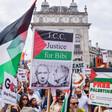Rights and Accountability 16 August 2016

Palestinian medics evacuate a youth wounded during confrontations with Israeli forces in al-Fawwar refugee camp on 16 August.
APA imagesA 19-year-old Palestinian died on Tuesday after Israeli soldiers shot him in the chest with live ammunition during an ongoing raid on al-Fawwar refugee camp in the occupied West Bank city of Hebron.
He is the 72nd Palestinian killed by Israeli forces so far this year in the West Bank, according to United Nations data.
The Palestinian Quds news site circulated this image of Muhammad Abu Hashhash:
Dozens of Palestinians were injured, five of them from live bullet wounds, during the massive raid on the refugee camp that began early Tuesday.Witnesses told Ma’an that “Israeli soldiers stopped an ambulance belonging to the Palestinian Red Crescent Society, which was trying to evacuate the young man who was seriously injured with live fire, and prevented the ambulance from leaving the camp.”
The ambulance transporting the seriously injured person, presumably Abu Hashhash, was allowed to leave the camp an hour later, locals told Ma’an.
Residents told Ma’an “that large numbers of Israeli troops surrounded the camp around dawn on Tuesday, when they began ransacking homes and interrogating residents in the streets.”
Israeli forces positioned snipers on top of Palestinian rooftops, Ma’an and other media outlets reported:
A makeshift medical clinic was set up to cope with the many injuries, according to Ma’an.The Israeli military told the Tel Aviv newspaper Haaretz that 23 were wounded during the raid, “and said that they had been struck in their lower extremities by rounds from the ‘Ruger’ rifle, considered to have less force than live fire.”
In October, the Israeli human rights group B’Tselem called on the Israeli army to “immediately cease” use of Ruger rifles and other small caliber guns because, contrary to the army’s claims, the weapons are used indiscriminately against Palestinian civilians, killing and severely injuring many, including children.
An army spokesperson told Haaretz that a large force of troops entered Fawwar camp to arrest wanted persons and search for weapons and were met with “a hail of stones, Molotov cocktails and improvised explosives.”
Some 50 homes were raided, according to Quds.
The outlet also reported that soldiers raided the slain youth’s home and fired a tear gas grenade inside it.
Several camp residents have been arrested during the raid, Quds added, including Muhammad Ahmad Abu Ajamia, 45, who was reportedly released from Israeli prison only 10 days earlier.
Israeli forces reportedly entered a clinic run by UNRWA, the UN agency for Palestine refugees, and threatened to arrest injured persons being treated there.
The Palmedia Media Center published video footage of the raid in al-Fawwar:
Daily life in al-Fawwar refugee camp, home to 10,000 Palestinians, was already disrupted following tightened movement restrictions imposed by the Israeli military in Hebron in early July after deadly attacks on settlers in the area.“The main entrance was closed and most of the dirt roads leading to it were blocked off,” according to B’Tselem, whose field researcher Musa Abu Hashhash filmed residents walking past the closed gate at the entrance:
The closure of the camp entrance put “a great burden on residents and caused a lot of anger and frustration,” B’Tselem stated.UNRWA protested the weeks-long closure of al-Fawwar, stating that it prevented “humanitarian access, including the delivery of medical supplies, the removal of refuse from the camp, and the daily movement of agency staff working inside the camp.”
“The main entrance is closed to vehicles, which has impacted camp residents’ ability to report to their work outside the camp,” the agency added. “The entrance can still be used by pedestrians, yet the extra distance that many have to travel to avoid closures incurs additional expenses impacting their already bleak financial situation.”

Israeli forces stop a Palestinian woman at the main entrance of al-Fawwar refugee camp on 16 August.
APA imagesUN Secretary-General Ban Ki-moon has said that the Hebron closures “amount to collective punishment.”
Collective punishment is forbidden under the Fourth Geneva Convention, to which Israel is a party.

Palestinians react after Israeli forces destroyed their home in the West Bank village of Sair on 16 August.
APA imagesMeanwhile, Israeli forces demolished eight homes in the outskirts of Sair village near Hebron on Tuesday. More than 50 Palestinians from the same extended family, including several children, were left homeless as a result, the Ma’an News Agency reported.
Twenty more Palestinians lost their homes during a demolition near Bethlehem as well.
The structures were demolished on the pretext that they were built without a permit. But Israel only grants a negligible number of permits to Palestinians who apply for them in areas of the West Bank where the Israeli military has full control.
B’Tselem says that in 2016, Israel has demolished the highest number of Palestinian homes in the West Bank since it began tracking demolitions on grounds of “lack of building permit” in 2006.
Editor’s note: An earlier version of this article stated that Muhammad Abu Hashhash was 17. It has since been corrected to state that he was 19.






Comments
Wisam Hashlamoun's photo of the lady at the checkpoint
Permalink Carol Scheller replied on
He has captured all the violence of the intolerable occupation in its essence : all anyone looking at it can say is, something is very very wrong. The situation can and will not continue indefinitely.